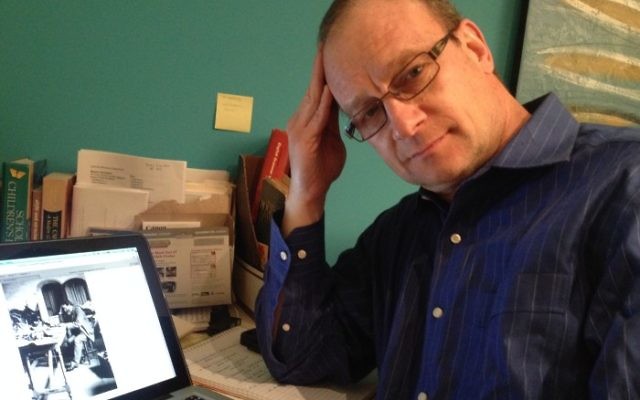The Jewish World Post-Oct. 7
For many Jewish Americans, fundamental aspects of life have been challenged by what happened that day and since.
Dave Schechter is a veteran journalist whose career includes writing and producing reports from Israel and elsewhere in the Middle East.
This is a lousy way to add leaves to the branches on your family tree, combing through articles about murdered and missing Israelis, looking for information about their parents, spouses, and children.
In the past couple of weeks, I have added about three dozen names to my tree, tracing them back to my great-grandfather’s twin brother, who emigrated in 1882 from Romania to what then was part of the Ottoman Empire and today is the Israeli town of Zichron Yaakov.
In the aftermath of the Oct. 7 Hamas attacks in southern Israel, a dozen people on or connected to this tree were missing and feared kidnapped into Gaza.
Hamas released a mother and daughter, residents of a Chicago suburb, who were kidnapped while visiting family at Kibbutz Nachol Oz. Ten others were at Kibbutz Be’eri. The bodies of two men were recovered several days ago and, as this was being written, the body of the wife of one of those men was found. Still missing is the wife of the other slain man; her daughter, son-in-law, and two grandchildren, and the sister and niece of her slain husband.
I may be on a different branch of the family tree, but as an Israeli cousin messaged: “We’re Ashkenaz, so every person up to the third or fourth branch is considered a closely related cousin.”
My wife has pointed out something that I had not considered, that my work provides me with an outlet through which to process these events. Where others may feel distraught and struggle to reconcile conflicted feelings, a lifetime in journalism has given me — for good or ill — the ability to collate and compartmentalize information.
The barbarism displayed by Hamas on Oct. 7 and the Israeli retaliation in Gaza have given many Jewish Americans pause to consider the Venn diagram of their personal relationships to Judaism the religion and Israel the nation.
Some seek solace in religion, which compels me to ask: During the Days of Awe, between Rosh Hashanah and Yom Kippur, were the babies butchered and burned by terrorists not inscribed in the Book of Life? The otherwise celebratory holiday of Simchat Torah now becomes the yahrzeit for 1,400 men, women, and children — the largest number of Jews killed in one day since the Holocaust.
I know politically liberal Jewish Americans who support the two-state solution, who oppose Israeli expansion in the West Bank, and who abhor Islamophobia — but who are absolutely seething at the atrocities committed by Hamas. These are not people who want to see Gaza reduced to rubble, or thousands of Palestinians killed, or Israel to reoccupy the Gaza strip. These are people resisting a desire for vengeance.
At the Oct. 10 Israel support rally in Sandy Springs, the most sustained cheering came when Mayor Rusty Paul, who is not Jewish, said, “Israel is going to do what Israel is going to do.”
The reaction of 1,100 inside the Byers Theatre and more than twice that number watching on the lawn outside suggested that many had no problem with something more than an eye for an eye.
Some seek solace in religion, which compels me to ask: During the Days of Awe, between Rosh Hashanah and Yom Kippur, were the babies butchered and burned by terrorists not inscribed in the Book of Life? The otherwise celebratory holiday of Simchat Torah now becomes the yahrzeit for 1,400 men, women, and children — the largest number of Jews killed in one day since the Holocaust.
Other Jewish Americans say that they grieve no less for the victims of Hamas, but oppose the scale, if not the action itself, of Israel’s military response and the tactics employed by the government, such as cutting off electricity and water to Gaza.
Young Jewish American adults, who have grown up with a multi-cultural, multi-ethnic, multi-racial, and multi-religious circle of friends, have found themselves marginalized by those for whom Jewish = Israel, and if Israel is the problem, then so are Jews.
There are Jewish Americans who have invested their time, energy, and money in support of liberal and progressive causes that align with their personal values as Jews. But this has not spared them a cold shoulder from people they thought were friends or allies, whom they thought shared a similar perspective on the world.
Some Jewish Americans are mystified by non-Jewish friends — who reached out after a gunman killed 11 Jews worshipping on a Shabbat morning at a Pittsburgh synagogue — but were silent when more than 100 times that number of Israeli Jews are slaughtered.
Those who question my use of that word — slaughter — can view the available video and photographs, or listen to interviews with ZAKA volunteers, who retrieve bodies and body parts for burial according to Jewish law, or the doctors conducting forensic autopsies.
It is revulsion with the savagery of these killings that has many Jewish Americans struggling with the better angels of their nature.
Meanwhile, the size and tone of anti-Israel protests in American cities — including in Atlanta — have prompted reappraisals of security measures at Jewish communal institutions, including synagogues, schools, and community centers.
These are challenging days for Jewish Americans — and for those updating their family trees.




comments